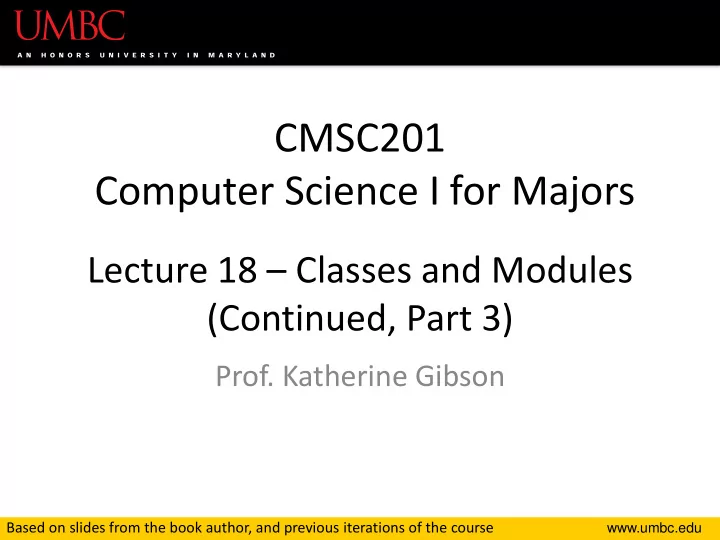

CMSC201 Computer Science I for Majors Lecture 18 – Classes and Modules (Continued, Part 3) Prof. Katherine Gibson Based on slides from the book author, and previous iterations of the course www.umbc.edu
Last Class We Covered • Constructors • Difference between – Data attributes – Class attributes • Special built-in methods and attributes • Creating and using a class 2 www.umbc.edu
Any Questions from Last Time? www.umbc.edu
Today’s Objectives • To harness the power of inheritance – To learn about subclasses and superclasses – To be able to redefine a method – To be able to extend a method • (Including __init__ ) • To correctly use public and private in classes • To understand name mangling and its purpose 4 www.umbc.edu
Find the Errors in the Code Below def student: def init(self, n, a, g): name = n There are at age = a gpa = g least seven def updateGPA(newGPA): unique errors gpa = newGPA def main(): val = new student("Alex", 21, 4.0) test = new student("Test", 18, 0) updateGPA(test, 3.26) main() 5 www.umbc.edu
Find the Errors in the Code Below def student: def init(self, n, a, g): name = n age = a gpa = g def updateGPA(newGPA): gpa = newGPA def main(): val = new student("Alex", 21, 4.0) test = new student("Test", 18, 0) updateGPA(test, 3.26) main() 6 www.umbc.edu
Find the Errors in the Code Below class student: def __init__(self, name, age, gpa): self.name = name self.age = age self.gpa = gpa def updateGPA(self, newGPA): self.gpa = newGPA def main(): val = student("Alex", 21, 4.0) test = student("Test", 18, 0) test.updateGPA(3.26) main() 7 www.umbc.edu
Inheritance www.umbc.edu
Inheritance • Inheritance is when one class (the “child” class) is based upon another class (the “parent” class) • The child class inherits most or all of its features from the parent class it is based on • It is a very powerful tool available to you with Object-Oriented Programming 9 www.umbc.edu
Inheritance Example • For example: computer science students are a specific type of student • They share attributes with every other student • We can use inheritance to use those already defined attributes and methods of students for our computer science students 10 www.umbc.edu
Inheritance Vocabulary • The class that is inherited from is called the – Parent class – Ancestor – Superclass • The class that does the inheriting is called a – Child class – Descendant – Subclass 11 www.umbc.edu
Inheritance Code • To create a child class, put the name of the parent class in parentheses when you initially define the class class cmscStudent(student): • Now the child class cmscStudent has the properties and functions available to the parent class student 12 www.umbc.edu
Extending a Class • We may also say that the child class is extending the functionality of the parent class • Child class inherits all of the methods and data attributes of the parent class – Also has its own methods and data attributes – We can even redefine parent methods! 13 www.umbc.edu
Redefining Methods www.umbc.edu
Redefining Methods • Redefining a method is when a child class implements its own version of that method • To redefine a method, include a new method definition – with the same name as the parent class’s method – in the child class – Now child objects will use the new method 15 www.umbc.edu
Redefining Example • Here, we have an animal class as the parent and a dog class as the child class animal: # rest of class definition def speak(self): print("\"" + self.species + " noise\"") class dog(animal): def speak(self): print("Woof woof bark!") 16 www.umbc.edu
Extending Methods • Instead of completely overwriting a method, we can instead extend it for the child class • When might we want to do this? – Constructor ( __init__ ) – Print function ( __repr__ ) – When else? 17 www.umbc.edu
Extending a Method • Want to execute both the original method in the parent class and some new code in the child class – To do this, explicitly call the parent’s version • One major thing: you must pass in the self variable when you call a parent method – This is the only time you should do this! 18 www.umbc.edu
Extending Example • Now we have a cat class as the child, with an additional data attribute sleepsAllDay class animal: def __init__(self, name, species): self.name = name self.species = species class cat(animal): def __init__(self, name, sleepsAllDay): animal.__init__(self, name, "cat") self.sleepsAllDay = sleepsAllDay 19 www.umbc.edu
Student Inheritance Example class student: """A class representing a student.""" def __init__(self, name, age): self.full_name = name self.age = age def getAge(self): return self.age class cmscStudent (student): """A class extending student class to CMSC students.""" def __init__(self, name, age, section): # call __init__ for student student.__init__(self, name, age) self.section_num = section def getAge(self): # redefines getAge method entirely print ("Age: " + str(self.age)) 20 www.umbc.edu
21 www.umbc.edu
Any Other Questions? www.umbc.edu
Announcements • Lab has been cancelled this week! – Work on your project instead • Project 1 is out – Due by Tuesday, November 17th at 8:59:59 PM – Do NOT procrastinate! • Next Class: Recursion 23 www.umbc.edu
Recommend
More recommend